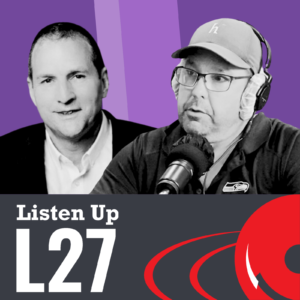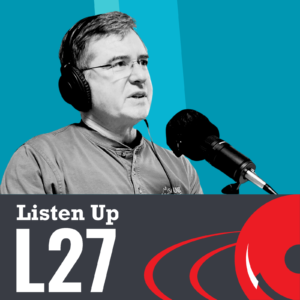Before you consider testosterone supplements…
In this episode of Listen Up L27, host Jen Pennington sits down with Dr. Marcie Hamrick from the Station 2 Clinic and Dallas Baker, Chair of the Seattle Fire Fighters HealthCare Trust, to take a grounded, myth-busting look at testosterone, “Low T,” and the realities fire fighters face when navigating hormone health.
Dr. Hamrick explains why fire fighters are uniquely vulnerable to symptoms often mistaken for low testosterone—chronic sleep disruption, high stress, heavy overtime, diet challenges, environmental toxin exposure, nicotine use, and untreated sleep apnea all play major roles. Together, the group breaks down the difference between lifestyle-driven fatigue and true hormonal imbalance, why proper testing matters, and the risks firefighters face when pursuing testosterone therapy without medical oversight—especially dangerous complications like erythrocytosis, thickened blood, clot risk, and falsely elevated PSA levels.
Dallas offers the fire fighter perspective on the pressures, schedules, and cultural factors that drive interest in testosterone supplementation, while reinforcing the value of having a primary care doctor—and avoiding “testosterone mills” built around selling hormone replacements.
The episode closes with practical steps: lifestyle changes that actually move the needle, safer strategies for managing fatigue and performance, and how new direct primary care options coming to the HealthCare Trust in 2026 can support long-term health and career sustainability.
Transcript
Intro:
Dr. Marcie Hamrick: So there are a variety of risks of testosterone replacement or supplementation that I think don’t get talked about enough.
There’s a couple that I particularly worry about in fire fighters.
The phenomenon of what’s called erythrocytosis, which is excess production of red blood cells that circulated in our bloodstream. It causes our blood to be more dense, more thick, more viscous, which increases the risk of blood clots.
Now, firefighters going into fire suppression scene already are at risk of blood clots due to dehydration and heat exposure.
Jen Pennington: Hey, Seattle firefighters, it’s Jen Pennington. And today on listen up L27, we have Dr. Marcie Hamrick from Station 2 Clinic. And we also have Dallas Baker from the HealthCare Trust. He’s the chair of the trust. Our topic today is gonna be testosterone and low t. So Dr. Hamrick and I are happy to be joined by Dallas Baker. So it’s not two women talking about testosterone.
And Dallas, just no pressure or anything, but you are speaking now for the Seattle firefighters and the members.
Dallas Baker: All male numbers 27.
Jen Pennington: Yes, yes.
Dr. Marcie Hamrick: And all men everywhere.
Jen Pennington: Yeah, and all men everywhere. So no pressure.
Dallas Baker: I’m comfortable.
Jen Pennington: All. All right, well, let’s get into it a little bit today.
So when you hear the phrase low T or testosterone issues in the fire service, what comes to mind from your perspective? And let’s start with you, Dallas.
Dallas Baker: So I first started hearing mostly about this low testosterone probably 10, 12 years ago.
And my concern at the time is is that I think a lot of members were self diagnosing through Dr. Google.
And so that I don’t know that for a fact, but that seemed to be the general consensus, you know, 10, 12 years ago, is that there was some self assessment there, more than a physician driven diagnosis.
Jen Pennington: And Marcie, do you want to tell us a little bit about what you’re hearing from your end?
Dr. Marcie Hamrick: Yeah, I think most of what I’m hearing is also through fire fighters, especially when they come into Station 2 clinic and they’re asking about whether we should check their levels or not.
So it’s in large part driven by podcasts, tiktokers, social media, and some information, maybe even pressure toward testosterone supplementation for performance athletes in particular.
So some of that interest, I think, is reasonable. There are risk factors that we’ll talk about for low testosterone that firefighters do in fact have.
And though there is an element of marketing toward this population.
Jen Pennington: Dr. Hamrick, do you think you can help, like debunk or explain some of those myths from a medical standpoint?
Dr. Marcie Hamrick: Yeah, I think there’s lots of things that cause fire fighters to feel tired, run down, not quite themselves.
My first thought when I hear that complaint is how well or how much are they sleeping, how good their nutrition is, how much they’re exercising, Maybe not enough or even too much sometimes, or how much stress or anxiety or burnout might be happening that’s contributing to those symptoms.
There are medical problems that can also contribute, like vitamin D deficiency or anemia or thyroid dysfunction.
Low testosterone is one of those causes. But those lifestyle factors like sleep, nutrition, exercise can also contribute to the low.
Jen Pennington: Dallas, from your perspective, what parts of the job, you know, are the biggest job drain, shall we say, on people?
Dallas Baker: Yeah, it’s all the things that Marcie just referred to. It’s the sleep deprivation. It’s working massive amounts of overtime and pulling all those additional shifts, which then leads to more sleep deprivation.
It’s the Zyn packets.
And sometimes when you’re working that often, it’s easy to forgo the workout that shift.
And then the other thing is a lot of the station meals have, you know, I’ve heard, I think it was Marcy that coined it as like, you know, Thanksgiving dinner, every meal at the station.
And so, you know, all of those contributing factors are also go along towards, you know, these symptoms that could mirror, mimic low T.
Jen Pennington: Dr. Hamrick, why do you think that firefighters are uniquely vulnerable to hormone disruption in low T?
Dr. Marcie Hamrick: Yeah, for a lot of the reasons Dallas just alluded to. Certainly shift work, sleep deprivation, chronic stress.
There’s a high incidence of sleep apnea that may or may not be treated. That can contribute having extra weight around the middle, which if you’re not sleeping well, if you’re eating Thanksgiving dinner twice a week, we tend to gain right around the middle, which can lower testosterone levels.
Not enough exercise or too intense exercise can contribute.
We know that eating unhealthy fats, processed foods, refined sugars can also contribute to low T.
Drinking too much can interfere with hormone balance as well.
Nicotine use can impair testosterone production. It and then the exposure to environmental toxins that are inherent to the job.
And these are endocrine disruptors and can affect testosterone levels as well.
Jen Pennington: Can you also talk about the risks specifically for fire fighters, like, we’ve heard about, like thickened blood, dehydration, clots or heat exposure, things like that?
Dr. Marcie Hamrick: Yeah, so there are a variety of risks of testosterone replacement or supplementation that I think don’t get talked about enough.
There’s a couple that I particularly worry about in fire fighters.
The phenomenon of what’s called erythrocytosis which is excess production of red blood cells that circulated in our bloodstream causes our blood to be more dense, more thick, or viscous, which increases the risk of blood clots.
Now, fire fighters going into fire suppression scene already are at risk of blood clots due to dehydration and heat exposure. But if they enter the scene already with too high a level of red blood cells, they’re at particular risk of on duty cardiovascular events like heart attacks and strokes. So that’s something that I really worry about. There’s another thing that I worry about, particularly in fire fighters, too, is that testosterone supplementation can increase PSA levels. The blood test that we use to detect prostate cancer.
It’s something we do as part of the fire fighter medical evaluation every year in male firefighters 40 years and above.
And if testosterone is falsely elevating that PSA level, we may think that you have cancer when you don’t, which can then lead to unnecessary specialist referrals and even biopsies, which nobody wants. Yeah, nobody wants that.
So those are the, you know, again, there’s, there’s a number of other risk risks of using testosterone, but those are the two that are uniquely worrisome in fire fighters.
Jen Pennington: Well, that was really interesting, though. About like, it can almost be like a false positive.
Dr. Marcie Hamrick: Exactly.
Jen Pennington: On your tests and whatnot. Is there a. Is there a level that you’re trying. Like when you see a test come back, is there a level that you’re. You want to see that’s in the normal range?
Dr. Marcie Hamrick: You know, it’s. It’s a really good point, Jen. They have. Studies have shown that people feel basically the same if their levels are on the low end, the middle end, or the high end of the testosterone levels on testing.
So I know there are people who have a belief that they should be on the high end of that, but in my mind, more testosterone increases the risks of those complications of using testosterone without any additional benefit.
Jen Pennington: What should young men be aware of when it comes to their testosterone levels?
Dr. Marcie Hamrick: I think that’s a great question.
It is not normal for men younger than 40 to 50 to have truly low testosterone levels.
Low T either points to a significant medical problem, like a genetic mutation that needs to be tested for or possibly a brain tumor or it’s related to lifestyle factors. But it’s very unusual for levels to be low that early in life.
So if someone actually has low testosterone by testing, they really need a medical evaluation.
Jen Pennington: So when you talk about TRT, when is it appropriate and when is it not?
Dr. Marcie Hamrick: Yeah. The first thing I think about is, does the person have symptoms of low T.
There are sort of non specific symptoms like fatigue and feeling blah, a lack of sense of well being. And then there are more specific symptoms like erectile dysfunction, a lack of libido, not waking up in the morning with an erection. Those are actually more specific to a low T level than those other non specific symptoms. So the first thing I look for is, is the person actually symptomatic when thinking about replacement and then checking testosterone levels in an optimal circumstance, which is having had a decent night of sleep the night before, within a couple hours of waking up, ideally between 7 and 9am and fasting. We know that those conditions, because testosterone varies so much day to day and throughout the day, it’s really important to get several good quality measurements before considering testosterone replacement.
Jen Pennington: So if you could choose two lifestyle changes that could make a really big difference in testosterone levels. I’ll go with you, Dr. Hamrick, and then I’ll talk about the reality of it with Dallas. What two would you choose?
Dr. Marcie Hamrick: I know I feel like a broken record sometimes and I’m going to cheat a little bit because when I thought about this question, I thought, I think taking off extra weight is really important. We know that fat, particularly around the middle, lowers our testosterone levels quite a bit. And in losing that weight, hopefully we are adopting a healthier diet and perhaps increasing our physical activity, which are also helpful.
The other thing that I think about is getting good quality sleep. So that’s also helped by staying active, managing stress and not using nicotine or overusing alcohol. So those are the big ones that I think of are extra weight, taking it off and getting good sleep.
Jen Pennington: And good sleep. One of the things that we’ve talked about a little bit in our past episodes is like limiting your caffeine intake, especially after a certain hour of the day.
Dr. Marcie Hamrick: Yeah. Not having caffeine, ideally after noon.
I’ve been encouraging people to use decaf.
I know that’s like a bad word in fire service, but I think that it’s a way of getting a warm drink that hopefully you like later in the day. But also nicotine. I think people sort of don’t think of it as much as they think of coffee as a interrupter of sleep.
Jen Pennington: And now for a realistic point of view, Dallas, what is realistic? I mean, how can they get to some of these things when we know it’s not possible?
You’re getting interrupted in middle of your shifts. You’re trying to get a little bit of sleep and you’re constantly interrupted.
Dallas Baker: Yeah, I think the best strategy is to manage your work schedule.
And so whether it’s through retirement planning so that you don’t have to work 2000 plus hours in your high five and make some of these total wellness or health compromises for financial gains.
And so I think through comprehensive retirement planning you can work a reasonable amount of overtime and still allow for some personal recovery time so that you can maintain good health into retirement as you’re managing your career along the way.
Jen Pennington: And when we talk about the right way to get Tested and evaluated, Dr. Hammert, what should they avoid?
Dr. Marcie Hamrick: I think avoiding clinics that market themselves specifically as testosterone clinics.
I find that a lot of the times people like everyone who sees someone at those clinics walks out the door with testosterone.
And I have heard through fire fighter patients that they don’t always check levels routinely as they should be.
So I have some concern about those.
Not that all of them are bad, but I do think people need to be careful about who they are talking to about nicotine testosterone replacement.
I refer people to a primary care doctor, sometimes endocrinology.
But I do think this is a good reason to have a primary care person to see in the event that you would like to test and think about the risks and benefits of testosterone replacement.
Jen Pennington: And if there’s one thing you want firefighters to walk away knowing about the testosterone, the health and the long term career sustainability.
Do you have any thoughts on that, either of you?
Dallas Baker: I think the, the approach that the healthcare trust would advocate for is that you get yourself a primary care physician. And we have coming in 2026, we’re going to have a new relationship with a company called Hint Health which can give you that direct primary care relationship with your primary care doc.
And that negates all of the co pays and deductibles that you normally have to pay.
And it’s I think a very healthy relationship with the physician that can get to know you much better and doesn’t rely on that six minute appointment time slot to be able to do your evaluation.
I also kind of to the point that Marcie was discussing, I don’t think it’s a great solution to rely on a physician whose personal profit is going to depend on you taking the medication that they’re going to prescribe you.
And so if you go to this clinic and their business model is selling testosterone, there’s a high likelihood that they’re going to suggest you need testosterone. And if you work with your primary care doc and they’re looking at a much more comprehensive evaluation and a thorough analysis of all your health versus just looking at one number and saying they have the solution to raise it, then I think that’s a much better solution than relying on this.
A testosterone mill.
Dr. Marcie Hamrick: Well, I agree with Dallas for sure.
I think that it is important to look at not just testosterone level, but it may include testosterone level. But looking at the root causes of those problems and addressing those will also have the benefits of reducing cardiovascular disease risk, cancer risk and quality of life overall. Just longevity, which supplementing testosterone has not been shown to do.
So I just really want for people’s overall health to look at those underlying causes.
Dallas Baker: That’s a good point.
Jen Pennington: Well, I want to thank you both for being here today.
We’ll be looking forward to seeing what the future holds in this topic. So thank you both.
Dallas Baker: Thank you, Jen.
Dr. Marcie Hamrick: Thank you.
Jen Pennington: Thanks for joining us. Listen up. L27 is a Seattle Fire Fighter HealthCare trust production. This podcast is produced by The Rhizome Collaborative. I’m your host, Jen Pennington. And until next time, stay safe and stay healthy.





